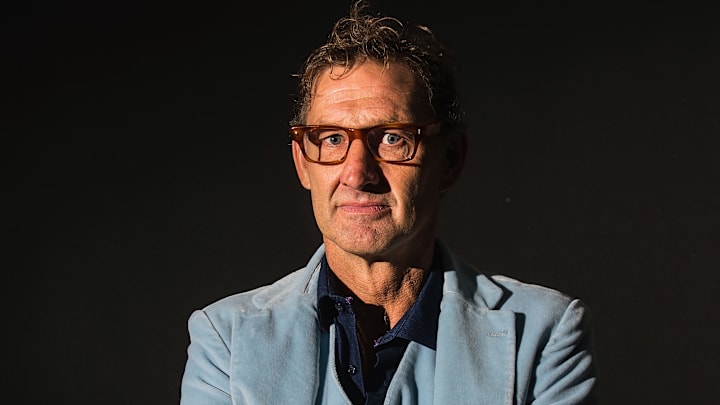One of the center-backs in Arsenal’s famous English back five of the 1990s—former captain of the club and the England national football team, and one of the greatest defenders in England’s top flight history—Tony Adams spent his entire career with the Gunners at Highbury.
Early Life in Football
Tony Alexander Adams MBE was born on 10th October, 1966 in London, England. He joined the youth ranks at Arsenal in 1980 and, over the next two decades, established himself as one of the greatest players in the club’s history.
Adams made his senior debut in November 1983, in what was then known as the First Division, at home against Sunderland. It would not prove to be the best day for the defender—he was at fault for the Black Cats’ first goal, had one of his own ruled out, and Arsenal lost the match 2-1—and he would only play in two further matches for the rest of the season.
The 1984-85 season was better for Adams. He made 18 total appearances for the club, 16 of them in the league, and helped Arsenal finish in 7th place. Next season, however, he was limited to just 10 appearances, all in the league.
Read More: Premier League Legends - Peter Schmeichel
Breakthrough and the Captain’s Armband
Adams rose to full prominence in the 1986-87 season, playing regularly for the Gunners all campaign, and helping them win the League Cup, his first major trophy. He scored six goals in 55 total appearances across all competitions, as Arsenal finished 4th in the First Division.
Manager George Graham handed the captain’s armband to Adams, aged 21, on 1st January 1988. The defender would make the role his own for the next 14 years, until his retirement in 2002, and come to be known as Mr. Arsenal.
It was the same season in which Arsenal signed both Nigel Winterburn and Lee Dixon, bringing together three of their famous English back five. Steve Bould followed Dixon from Stoke to London at the end of the season, and David Seaman was signed from Queens Park Rangers in 1990.
Read More: Premier League Legends - Lee Dixon
The Third Greatest Player in Arsenal History
Adams led Arsenal to two First Division titles as club captain: in 1988-89 and 1990-91. The Gunners defense remarkably conceded only 18 goals during the latter title-winning campaign.
Next season, in 1992-93, Adams helped Arsenal become the first English team in history to win the FA Cup and League Cup double.
Adams was Arsenal captain for another two league titles, winning the Premier League in 1997-98 and 2001-02 under Arsène Wenger. In both seasons, the club won the league and FA Cup double.
“When I first came to Arsenal, I realised the back four were all university graduates in the art of defending. As for Tony Adams, I consider him to be a doctor of defence,” said Arsène Wenger, speaking about Adams in 1997.
In 19 seasons at Highbury, Adams scored 49 goals in 669 total appearances across all competitions—32 in 504 league matches—and was named Arsenal Player of the Season on three occasions: in 1986-87, 1989-90, and 1993-94.
Adams ranked third in the list of 50 Gunners Greatest Players compiled through thousands of Arsenal fan votes on the club’s official website in 2008. He was inducted into the English Hall of Fame in 2004, the Premier League Hall of Fame in 2023, and was awarded Member of the Most Excellent Order of the British Empire in 1999.
Read More: Premier League Legends - Brian Deane
List of Honours
First Division/Premier League [4]: 1988-89, 1990-91, 1997-98, 2001-02
FA Cup [3]: 1992-93, 1997-98, 2001-02
League Cup [2]: 1986-87, 1992-93
European Cup Winners' Cup [01]: 1993-94
FA Charity Shield [03]: 1991 [Shared], 1998
Football League Centenary Trophy [01]: 1988
Adams represented England at U17 and U21 level, and scored five goals in 66 senior appearances for the national football team. He made his debut in 1987 against Spain, and became the first player born after the 1966 World Cup win to represent the nation.
